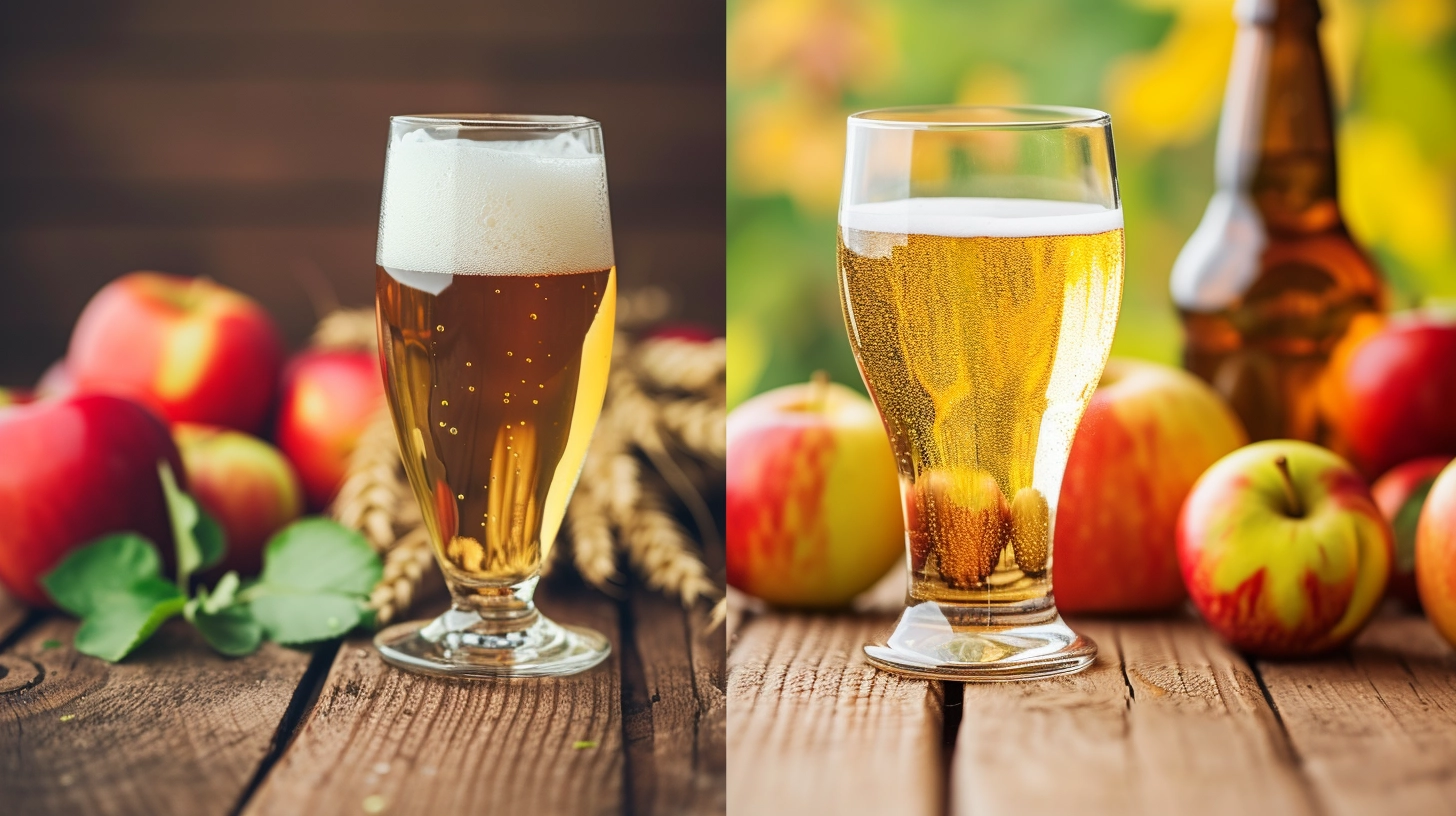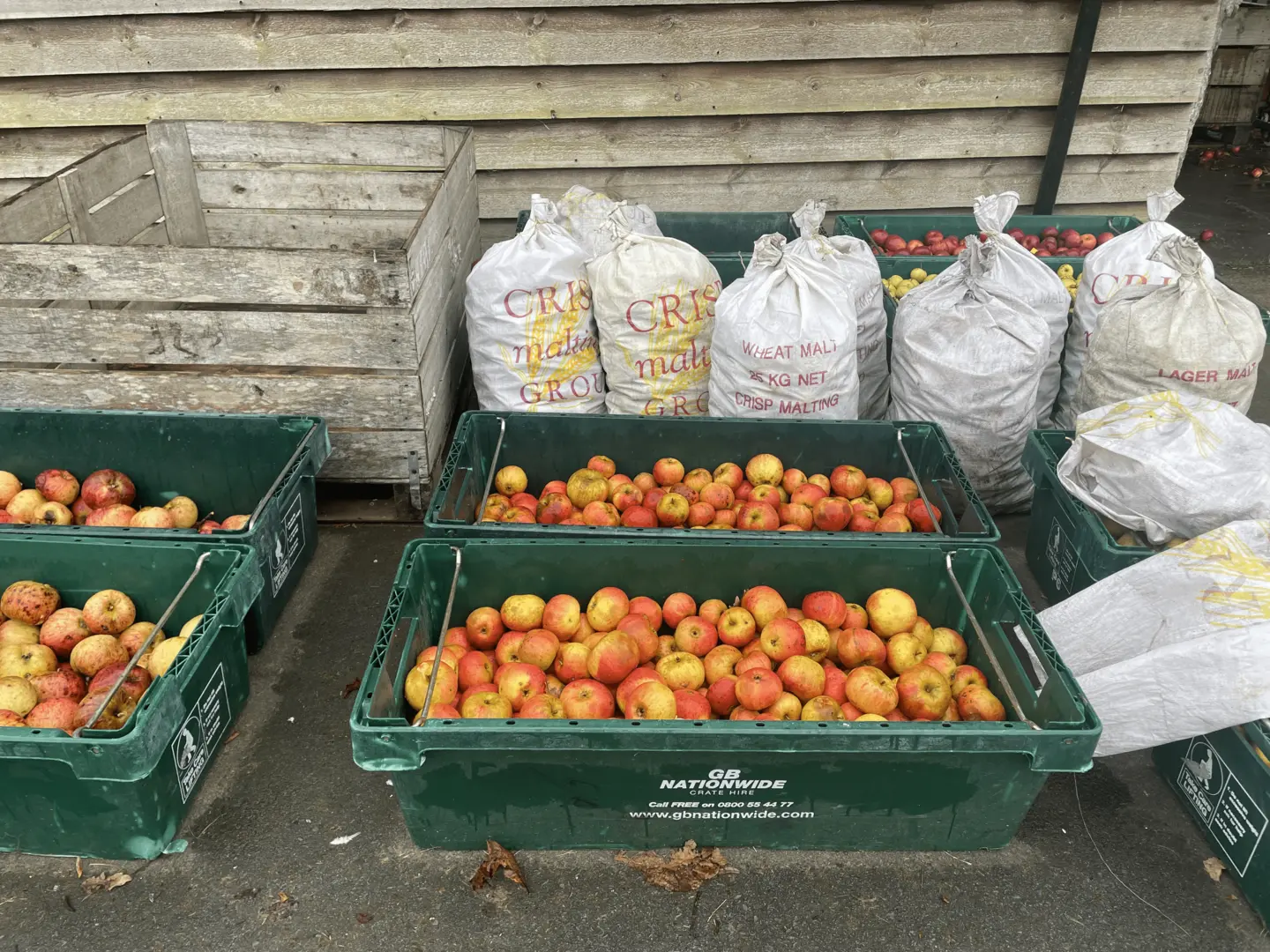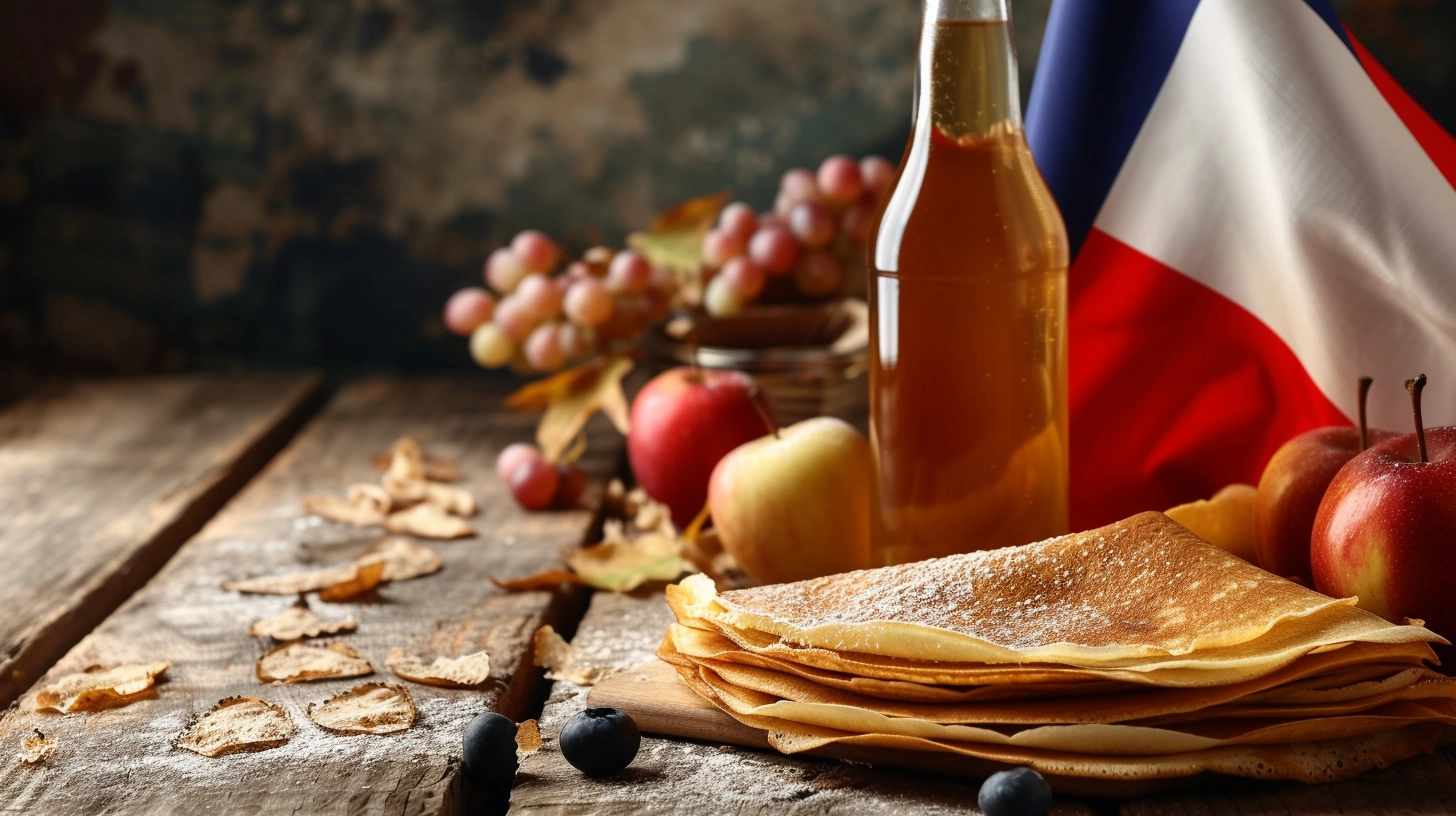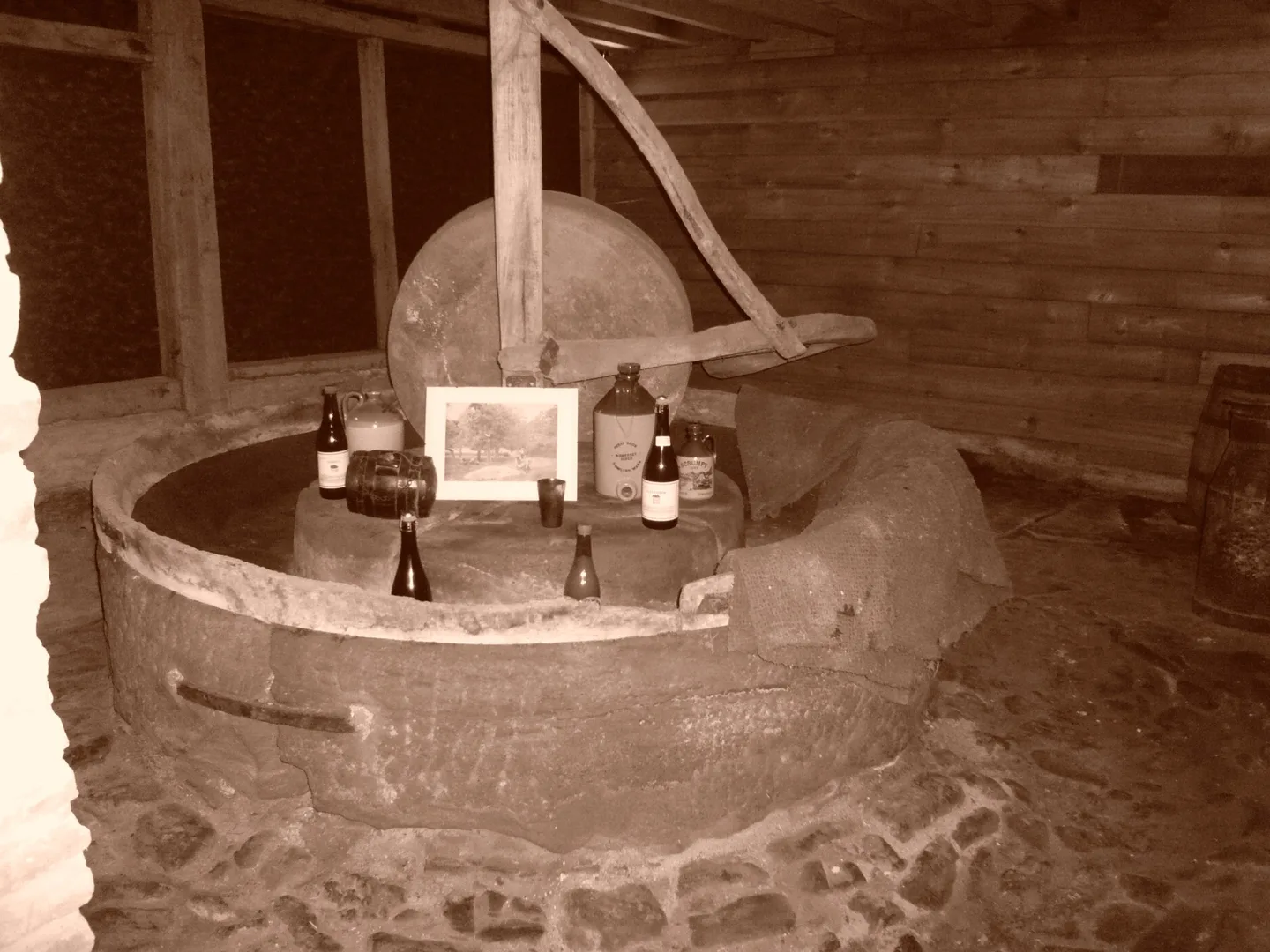Ingredients and flavour
Cider
Fermented apples make cider, and the quality of the apples affects the taste of the cider. Modern cideries often experiment with various apple varieties, from sweet to dry, to create a spectrum of flavours. Some cider makers add different fruits such as pears to make perry, berries, and even tropical fruits to create new and refreshing flavours.
The taste ranges from sweet to dry, still to sparkling, and clear to cloudy.
Beer
On the other hand, beer primarily consists of four key ingredients: water, malted barley, hops, and yeast. The malted barley provides the sugars needed for fermentation, while hops contribute bitterness, flavour, and aroma. Yeast is the magic microorganism that ferments the sugars, creating alcohol and carbon dioxide. Water quality, including minerals, is important for beer’s taste and mouthfeel.
The taste varied just as much as cider. Ales can vary from fruit Belgain styles to hoppy American IPAs Lagers, known for their crisp and clean taste, offer everything from light and refreshing pilsners to dark and malty drinks.
Health and Nutrition Comparison
Cider and beer have different effects on calories, carbs, sugar, gluten, and antioxidants. They impact physical health, digestion, and mental well-being. Knowing the differences is crucial before choosing.
Calories
Cider
Dry ciders have fewer calories, about 150 per 355ml, similar to a small chocolate bar. Sweet varieties have more calories because they have more sugar, similar to the calories in a slice of cake. The natural fruit sugars in cider can influence blood sugar levels, potentially affecting energy and mood.
Beer
The calorie content of beer varies a lot. Light beer has around 95 calories, which is like a medium apple. Heavier craft beers can have over 200 calories per 355ml, similar to a large bagel. Beer can affect digestion and lead to weight gain if not consumed in moderation due to alcohol and carbs.
Carbs
Cider
Carbohydrate levels in cider are largely dependent on the fermentation process. Ciders that are fully fermented have less carbs because the sugars turn into alcohol. They usually have 10-20 grams of carbs per serving, which is like a small bowl of salad.
Beer
Beer generally contains a higher amount of carbohydrates compared to cider. It typically contains around 10-30 grams of carbs per serving. This is similar to the amount found in one or two slices of bread. Different types of beers have different amounts. Lighter beers have fewer carbs, while stouts and porters have more due to sugars and malt.
Sugar
Cider
The sugar content in cider results directly from the apples used and the fermentation process. Dry ciders have minimal or no sugar, while sweet ciders can contain up to 20-30 grams per serving, comparable to the sugar content in a can of soda, impacting those monitoring their sugar intake.
Beer
Beer typically has less sugar than cider. Most types of beer have little to no added sugars. The sweetness in beer is comparable to the natural sugars found in whole-grain bread. These sugars are complex and less likely to cause a spike in blood sugar levels.

Gluten
Cider
A significant advantage of cider, especially for those with dietary restrictions, is its naturally gluten-free status. For people with celiac disease or gluten sensitivities, it is a good and safe choice. It provides a gluten-free option without any concerns.
Beer
Traditional beer, brewed from barley or wheat, contains gluten. The rise of gluten-free and reduced-gluten beers has broadened options allowing those avoiding gluten to still enjoy the rich diversity of beer flavours without adverse health effects.
Antioxidants
Cider
Cider, especially those crafted from whole apples, includes antioxidants like polyphenols found in apple skins. These antioxidants can provide health benefits, like reducing inflammation, similar to green tea.
Beer
Beer, particularly darker varieties, is also rich in antioxidants, derived mainly from hops and malt. These compounds contribute to heart health and may protect against certain diseases, similar to the antioxidants in dark chocolate.
Nutrition Health Comparison Summary
When comparing the health and nutrition aspects of cider and beer, it’s clear that both drinks have their pros and cons. Cider is a healthier choice for people with dietary restrictions because it is gluten-free and has antioxidants from fruit. Beer has calories and carbs, but it also has some antioxidants and sometimes, less sugar.
Ultimately, the impact of these drinks on health depends on the individual’s dietary requirements, moderation in consumption, and the specific product chosen. At the end of the day you should drink what you enjoy.
Environmental impact
Cider’s environmental impact
Sustainable orchards that use organic farming methods and integrated pest management can reduce the environmental footprint, minimizing pesticide use and promoting biodiversity. Cider has a relatively small water footprint compared to other crops, but packaging and transportation can have a large impact. Glass bottles and aluminum cans are the most common packaging options, each with its own lifecycle emissions and recycling rates.
Beer’s environmental impact
The environmental impact of beer can be significant, with water and energy use being the major factors. Sustainable brewing practices, including energy efficiency measures, water recycling, and sourcing ingredients locally, can mitigate some of these impacts. The choice of packaging—whether it’s cans, bottles, or kegs—also affects the environmental footprint, with bulk containers like kegs generally being more eco-friendly due to their reusability.
Food Pairings
Cider Pairings
The sweetness of some ciders pairs well with spicy foods, balancing the heat with its fruity undertones. For festive occasions, mulled cider provides a warm, spiced option that celebrates traditional flavours.
Beer Pairings
Light lagers pair well with light dishes like seafood or salads, while the robust flavours of stouts and porters complement heartier meals, such as grilled meats and rich desserts. Craft beers, with their unique flavour profiles, offer endless pairing possibilities, encouraging experimentation with food combinations.
https://www.nhs.uk/live-well/alcohol-advice/calories-in-alcohol/





